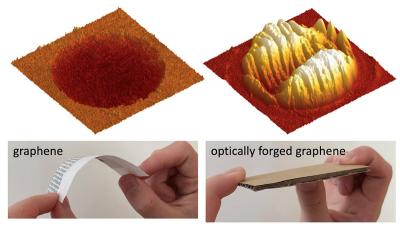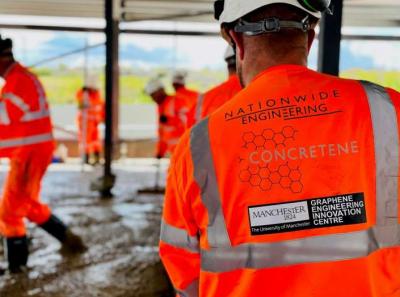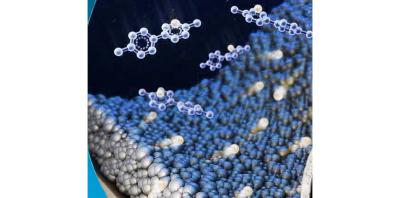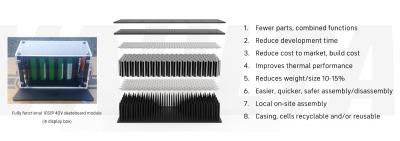The Graphene-Info weekly newsletter
Published: Tue, 06/01/21
Graphene turned ultrastiff by optical forging
Researchers at the Nanoscience Center of the University of Jyväskylä have demonstrated how an experimental technique called optical forging can make graphene ultrastiff - increase its stiffness by several orders of magnitude. Graphene typically has ultrasmall bending modulus, but the research group at the University of Jyväskylä has demonstrated how to make graphene ultrastiff using a specifically developed laser treatment. This stiffening opens up whole new application areas for graphene.
 Top - Atomic force microscopy images of the suspended graphene drum skin before and after optical forging. Bottom - analogue presentation of how a material can become stiffer when it is corrugated. (Image: University of Jyväskylä)
Top - Atomic force microscopy images of the suspended graphene drum skin before and after optical forging. Bottom - analogue presentation of how a material can become stiffer when it is corrugated. (Image: University of Jyväskylä)
The same group has previously prepared three-dimensional graphene structures using a pulsed femtosecond laser patterning method called optical forging. The laser irradiation causes defects in the graphene lattice, which in turn expands the lattice, causing stable three-dimensional structures. Here the group used optical forging to modify a monolayer graphene membrane suspended like a drum skin and measured its mechanical properties using nanoindentation.
Graphene-based concrete used in a commercial setting for the first time
Construction company Nationwide Engineering has reported the laying of the world's first graphene-enhanced concrete slab engineered for sustainability in a commercial setting.
 Team from The University of Manchester and Nationwide Engineering laying the world's first engineered graphene concrete in a commercial setting. Credit: The University of Manchester/Nationwide Engineering
Team from The University of Manchester and Nationwide Engineering laying the world's first engineered graphene concrete in a commercial setting. Credit: The University of Manchester/Nationwide Engineering
The venue for this innovation milestone is located a couple of miles east of the ancient monument of Stonehenge - the new Southern Quarter gym in Amesbury's Solstice Park, owned and run by military veterans and due to open in summer 2021. This enterprise has been made possible by a joint venture between Nationwide Engineering and The University of Manchester.
Fighting climate change with graphene, by Graphex Technologies
Climate change is a serious threat to the ecosystem and the planet, and many efforts are made in order to achieve a zero-carbon footprint and limit global warming. Fighting climate change would have to involve a substantial shrinkage in greenhouse gas emissions and a paradigm shift towards developing and using more eco-friendly, renewable energy technologies.
 Spherical graphite by Graphex
Spherical graphite by Graphex
When contemplating a 'greener' future, it seems inevitable that the transportation sector would have to play a decisive role in achieving a carbon-neutral society, and the next few years are expexted to mark a shift towards electric vehicles. However, existing electric vehicles face great challenges in terms of public acceptance, as concerns regarding driving range per charge and vehicle price linger among consumers. To become the predominant technology, electric cars would have to replace the current large and bulky batteries with more advanced and efficient ones that would improve performance and bring down costs.
Vaulta enters MOU with Braille, Grafoid and Focus Graphite to explore applications for its graphene-enhanced battery casings
Australian battery casing company, Vaulta, has announced the signing of a memorandum of understanding with Braille, Grafoid and Focus Graphite.

Vaulta signed the MOU to pair its innovative graphene-based cell casing technology with three Canadian companies focused on battery energy solutions and the development of creative applications for graphene. Vaulta will work with Braille Energy Systems Inc. (BESI), Focus Graphite Inc. and Grafoid Inc. to conduct market analysis to identify new sectors of interest and co-developed projects.
Research project explores graphene-enhanced composites for aircraft components
A collaborative research project between RISE SICOMP, GKN Aerospace Sweden, Nexam Chemical and Woxna Graphite, aimed to explore graphene-modified composites for long time- and high temperature applications, which can be used in aircraft components and other applications where the demands for durability are exceptionally high. The project took place August 20, 2019 – February 19, 2021.
Graphene was added as surface protection in the project, as a matrix modifier. Composites, with and without graphene, were manufactured and tested in the exact same way for comparison and reference.




